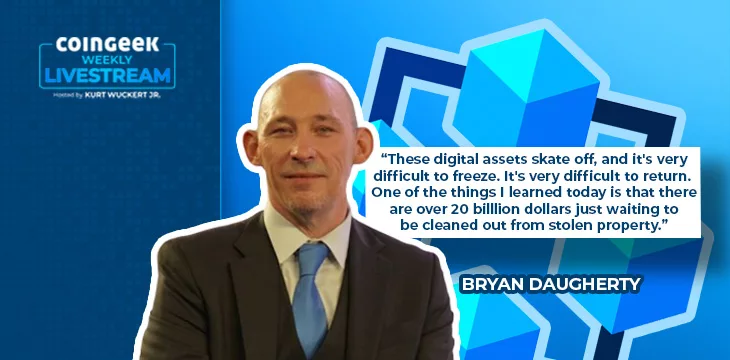|
Getting your Trinity Audio player ready...
|
Chairman of SmartLedger, Bryan Daugherty, joined the CoinGeek Weekly Livestream to talk about digital asset recovery, regulations, and his recent interactions with governments and regulators. It was an informative look at what’s going on behind closed doors.
Daugherty joins the Livestream from Germany
Daugherty begins by telling us he’s in Germany for a working group by Interpol and the Bavarian State Ministry of Justice. He says they’re looking at digital asset recovery and what the future of digital assets and law enforcement might look like. He was happy to give them the information to build a comprehensive framework.
Daugherty notes that digital asset recovery is a contentious issue in the industry, but at the end of the day, it’s property. “We need a recovery method,” he says, quoting Satoshi on stolen gold turning into lead.
Imagine if gold turned to lead when stolen. If the thief gives it back, it turns to gold again – Satoshi Nakamoto
Wuckert asks what their level of sophistication and understanding of these issues is. Daugherty says it’s more advanced than most give them credit for. However, he notes that they hadn’t considered developer groups having fiduciary duties or mining groups complying with the law. As things stand, they rely on centralized exchanges to comply with freezes.
From here, Daugherty will head to the BSV Blockchain Association HQ in Switzerland and then head to Dubai for the GITEX tech conference. SmartLedger will present CertiHash there, demonstrating a valid use case for blockchain technology.
Sentinel Node by Certihash
For those who don’t know, Sentinel Node is a next-generation cybersecurity tool that monitors the state of computer files and networks, taking a snapshot every 10 seconds and writing a record to the BSV blockchain.
Wuckert says he often uses this tool as an example of how the blockchain can be used. Daugherty agrees, saying it breaks through the discussion of coins and speculation and demonstrates how the BSV blockchain can be used for utility.
The CertiHash team wanted to start with detection as it’s a good value proposition. As Daugherty has said elsewhere, Sentinel Node dramatically reduces the time it takes to detect a breach from 221 days on average to mere seconds. This affordable tool also brings next-generation cybersecurity to everyday people and smaller organizations like schools, hospitals, etc.
On top of detection, Sentinel Node also brings hitherto unseen accountability to cybersecurity. Its alerts have to be acknowledged by a network administrator, who also has to record what actions were taken to correct the issue.
A viewer wonders whether cloud-based solutions could solve the same problems without the need for the BSV blockchain. Daugherty answers that it’s clear they can’t—that’s why the global average detection time is 221 days. Furthermore, these solutions rely on other third parties detecting and analyzing things for you, which is a weakness or attack vector.
Daugherty’s work with regulators
Wuckert pictures Daugherty’s work with regulators all over the world. He has been on a mission to inform, educate, and talk with governments all across the planet, including attending over 200 Capitol Hill meetings in one and a half years.
Daugherty says “things are moving,” and the headlines don’t represent what’s actually happening. Regulators from the United States, United Kingdom, European Union, and further afield are starting to get it.
In talking to people in power about these topics, many of them realize the inefficiencies of their own systems and processes. Daugherty gives the example of applying for a handicap placard in Manhattan; this involves sending your data to the department without guaranteeing you’ll get it. Furthermore, approximately 50% of the issued placards are fraudulent.
Mining economics and scalability
Daugherty has written extensively about the need for utility, scalability, and transaction fees to replace block subsidies. This includes several eBooks, which he thanks Wuckert for helping him with from the mining side.
Daugherty says he was shocked after attending a mining conference in Miami, where he talked to many miners with vast amounts of money invested and realized they didn’t have long-term business plans.
In many cases, they hadn’t even thought much about Bitcoin’ halvenings’ and the reduction in revenue that would lead to block-subsidy miners. Since the honesty of miners is crucial to the integrity of the blockchain, that they haven’t thought about this is “scary,” he says.
Transaction fees are necessary to make up for the reduction in block subsidy, which will require bigger blocks, which in turn will require the blockchain to be scalable. These factors all tie in together, and Daugherty says his ebooks elaborating on the subject can all be found on the BSV Blockchain Association website.
To learn more about Wuckert and Daugherty’s thoughts on mining, the blockchain trilemma, TicketMint, and whether SmartLedger accepts investors, listen to the CoinGeek Weekly Livestream episode here.

 07-08-2025
07-08-2025 





